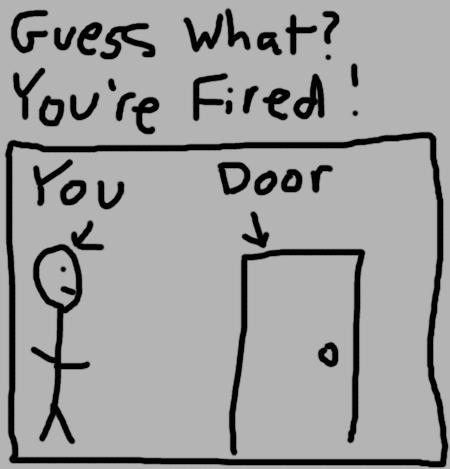 In my first post on this subject, I discussed some important, basic advice about how to handle the you’re-going-to-get-fired meeting. If you want to get a more detailed view of what we tell people who come to see us before they get fired, read on.
In my first post on this subject, I discussed some important, basic advice about how to handle the you’re-going-to-get-fired meeting. If you want to get a more detailed view of what we tell people who come to see us before they get fired, read on.
1. This is going to suck.
Perhaps this isn’t a news flash, but this process is going to be emotionally difficult. Your instinct may be to avoid it or react angrily. That’s normal, but this is a time when you need to leash these emotions. It’s time to act like a shrewd card player. Don’t let them throw you. Your job here is, as we’ll talk about in a moment, to watch and listen.
So, do whatever you need to do to get that game face on. It’s perfectly understandable that your first reaction may be to cry, get angry, or both. Work those emotions out as best you can outside of work.
Meeting with an attorney can play a big part in this. Yes, we are not therapists. But knowledgeable employment attorneys will have seen this many, many times. And—this is key—they’ve seen people live through it, often ending up in a better place at the end. An attorney can share that perspective with you.

2. Try to get the meeting moved so that you can talk to an attorney.
This rarely works, but it’s worth a shot. If you can get an extra week or so, you can try to schedule time with an attorney to evaluate the strength of any claim that you might have. He or she can also give you some strategies (which we share below) about how to handle the meeting. It’s also always nice to have a lawyer you can call if something goes really wrong at the meeting.
Here is an important point if you are reading this before you’ve gotten that call from human resources. See any attorney as soon as you can, particularly if you think you have been the victim of discrimination or know of wrongdoing at your company. You have a key card to play: you can put your employer on notice of the wrongdoing or discrimination. Doing so will give you an entirely different and more powerful claim. Waiting to do this when your employer has already started termination proceedings is usually too late. This can be tricky terrain to negotiate, which is why it’s best to do it with the help of an attorney, even if he or she is only advising you behind the scenes.
3. Determine whether you want an attorney with you at the meeting.
The truth is that it is very rare that you are entitled to an attorney in a termination meeting. For the vast majority of termination meetings in the private sector, you have no right to have an attorney. Here are a few exceptions.
The Company Has an Attorney
You have an attorney, and the company brings its attorney to the meeting.
This is yet another rare scenario. For most termination meetings, only a human resources rep will be present.
Sometimes your boss might show up, but usually not. He or she does not want to be there for that discomfort. (That’s what human resources gets paid for.) However, for some high-profile employees, or if your firing may be problematic—usually because the company is afraid it might have some liability for wrongful termination—the company might bring its attorney along. That fact alone does not mean that you are entitled to an attorney. You are only entitled to an attorney if you are represented and the company knows it.
To be clear about the law, it’s not so much that you are entitled to an attorney at the meeting as it is that your company cannot communicate with you through its attorney if you have an attorney. The source of this requirement is not the law but rather attorney ethics rules. You can find the prohibition under the American Bar Association’s Model Rule of Professional Conduct 4.2, which has been adopted by most states.
It would work like this:
Before being fired, you do your due diligence and consult with an employment lawyer, one who primarily represents employees. During the meeting, she talks to you about your options for negotiating severance with the company. You decide to sign a contract to retain her to advise you through the process, but—at least at first—behind the scenes.
It is a key point that you have retained the attorney. Simply going to talk to an attorney does not make you a represented party for the purposes of Rule 4.2.
One thing that attorney will tell you to do is to report the discrimination you’ve been experiencing at work to human resources. Until you received the advice, you had been trying to be a good corporate citizen and just deal with it. So, you send an e-mail to HR.
You understood that you very well might get fired. Your lawyer has advised you that when that happens, you should mostly just listen.
One day after you report the discrimination, you get an e-mail from human resources that you must attend a meeting in the main conference room at 2:00. You steel yourself for what is coming. Still, you are caught off guard when you walk into the room and see the vice president of human resources (whom you know) and not one, but two, lawyers in stereotypical pinstriped suits. The meeting, as it turns out, is an interview of you about the subject of your complaint. You try to follow your lawyer’s advice and just listen, but it turns out that just won’t be possible. The lawyers start peppering you with questions as if you were the bad guy.
There is nothing inherently illegal about what the company is doing, even if it is a bit underhanded. This is not a criminal proceeding, so you don’t have a right to a lawyer.
But because you are represented, the company lawyers—once they know you are represented—are barred from talking to you about the subject of the investigation. Note that you have to have an attorney who represents you to help you with matters related to your job. An attorney who represents you for your will, for instance, is not enough to trigger the requirements of Rule 4.2.
How would this work in practice? You walk into the room and, when the company attorneys start questioning you, you say, “I have an employment attorney who is helping me with this issue. I won’t answer any questions about this; you need to talk to her.”
But here’s a catch. Rule 4.2 only prevents the company attorney from talking to you about the investigation. It does not prevent the company itself from talking to you about your job, even the “investigation.” (I put “investigation” in quotes because in this scenario, it’s not a real investigation; the company is out to shut this down by making you a scapegoat.) So, if the human resources rep turned to the lawyers and said, “Take a hike, guys. I’ve got this,” she can keep right on talking to you, even about matters related to your employment.
Here’s yet another wrinkle. Even though the attorneys are no longer in the room, they can still violate Rule 4.2 if they direct the investigation behind the scenes. So, in this scenario, the company attorneys are still arguably in violation if the human resources representative simply takes the written questions prepared by the attorneys and starts going down the list.
What to do? It’s a bit of a tough call. You could certainly say, “Are those questions prepared by the attorneys? If so, that’s still a violation of Rule 4.2 unless my lawyer is here.” What if the human resources person says, “No, these are my questions,” but you suspect she’s lying? There’s not much you can do to enforce the issue. The best course of action is to appeal to her sense of fairness and ask to delay the meeting for a day so that you can at least talk to your own attorney. The tricky part, however, is that in most instances, the company can legally fire you for failing to participate in a company investigation. That’s not a place you want to be in. So, if your back is up against the wall, play along. Answer truthfully, but say as little as possible. Write down the questions so that you can later share them with your attorney.

Law Enforcement and Government Investigations
Some meetings could involve law enforcement or questioning by company counsel as part of a government investigation. These situations are rare, but they do happen, especially in highly regulated industries like pharmaceuticals.
How will you know if this is such an investigation? If it is being conducted by law enforcement, the company has to tell you. And those attending will likely have badges and guns that give it away. If it is company counsel or an outside law firm conducting the interview as part of a government investigation, the attorney is supposed to give you notice of that.
In either situation, my recommendation is simple: tell them you will not talk until you’ve had time to consult your own attorney. In rare instances, you could be fired for refusing to participate. However, most of the time, you will not lose your job for this. Understand that this is part of a “white-collar” investigation for, as an example, fraud or bribery, and it can be darn hard sometimes to tell if you could potentially be in trouble. If push comes to shove, it’s better to lose your job than risk admitting to a criminal violation.
You should understand that, no matter what law enforcement tells you, it does not make you “look guilty” if you talk to an attorney first. Understand that it almost never hurts you to talk to an attorney before answering questions.
Indeed, in investigations being conducted by the company on behalf of the government, the company will sometimes pay for you to have an attorney. If so, you should take the company up on this. In this investigation, the company can get in the government’s good graces if it gives it evidence of any wrongdoing committed by its employees. For more on this, read up on something call the Yates Memo. In short, the company has an incentive to turn over whatever you say to government investigators. This is important to you because that company can hand over that information even if you would otherwise be protected by the Fifth Amendment from disclosing it. So, do yourself a favor. Don’t talk to them until you’ve talked to an attorney first.
You can read more about workplace investigations on our website here.





